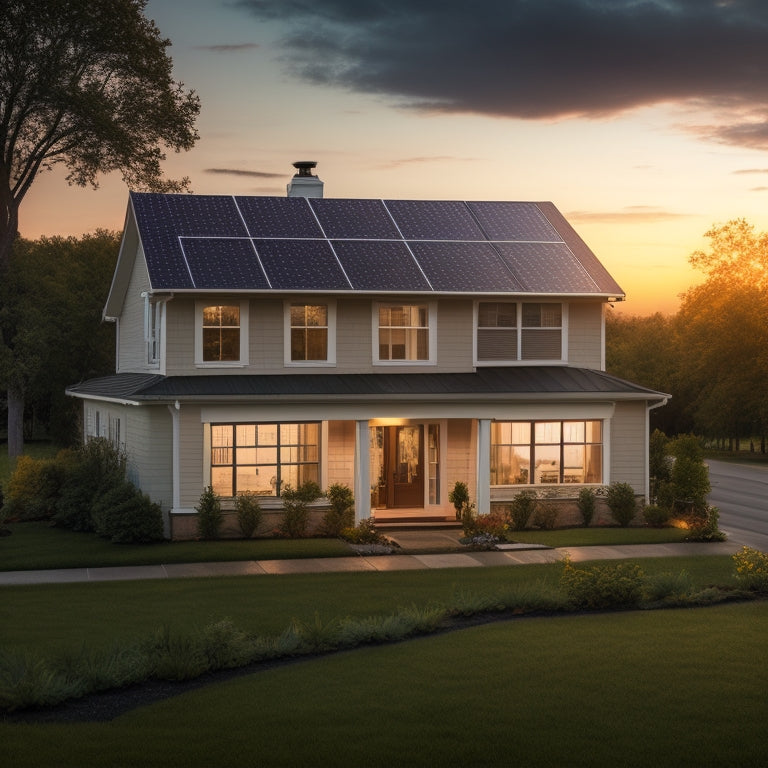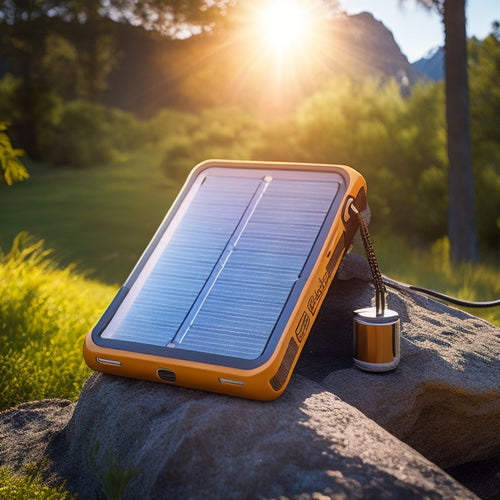
Top 3 Benefits of Home Energy Storage Systems
Share
By investing in a home energy storage system, you can gain access to a trifecta of benefits that revolutionize your energy usage, including enhanced energy security, significant cost savings, and reliable backup power during outages. With energy storage, you'll enjoy a consistent energy supply during power outages, while also shaving peak hour energy usage by 20-30% and reducing daily energy costs by 10-20%. Plus, you can save up to 40% on your overall energy bills by self-consuming renewable energy. As you investigate the world of home energy storage, you'll unearth even more ways to optimize your energy usage and take control of your energy independence.
Overview
- Home energy storage systems provide enhanced energy security and reliability during power outages or grid failures.
- They guarantee reduced energy bills through optimized energy usage, peak hour shaving, and load shifting.
- These systems offer backup power during outages, protecting against unexpected energy disruptions and promoting sustainable living.
- Home energy storage systems achieve grid independence through high-capacity solar inverters and smart charging.
- They facilitate real-time monitoring, optimizing energy usage and reducing carbon footprint for a more sustainable future.
Energy Security and Reliability
One of the most significant advantages of home energy storage systems is the enhanced energy security and reliability they provide. You'll have peace of mind knowing that your energy needs are met, even during power outages or grid failures.
With a home energy storage system, you can integrate renewable energy sources, like solar or wind power, into your energy mix. This means you're not reliant on the grid, and you can enjoy grid independence, which is made possible by high-capacity solar inverters that convert DC power to usable AC power efficiently.
Additionally, a strong battery bank and smart charging system guarantee steady electricity supply during low sunlight or nighttime. Renewable integration also allows you to store excess energy generated during the day for use at night or during periods of low energy production.
This guarantees a consistent and dependable energy supply, giving you the freedom to live life on your own terms.
Reduced Energy Bills Guaranteed
Your energy independence comes with a significant financial benefit: reduced energy bills. With a home energy storage system, you can optimize your energy usage and reduce your reliance on the grid. This means you'll be paying less for energy, enjoying significant cost savings over time.
| Scenario | Energy Savings | Cost Efficiency |
|---|---|---|
| Peak Hour Shaving | 20-30% | 15-20% reduction in peak hour charges |
| Load Shifting | 10-20% | 5-10% reduction in daily energy costs |
| Self-Consumption | 30-40% | 20-25% reduction in overall energy bills |
Backup Power During Outages
When the grid goes down, a home energy storage system becomes your reliable backup plan, providing power during outages and ensuring your home remains comfortable and secure.
You'll have peace of mind knowing you're protected from unexpected disruptions. With a home energy storage system, you can shave peak energy usage and reduce your reliance on the grid, even during outages.
This is especially important when integrating renewable energy sources, like solar or wind power, into your system. Advanced technology in systems like Sonnen Eco promotes sustainable living, and real-time monitoring in systems like SimpliPhi optimizes usage.
By storing excess energy generated during the day, you can use it at night or during outages, reducing your carbon footprint and increasing your energy independence.
With a home energy storage system, you're in control of your energy, even when the grid isn't.
Frequently Asked Questions
Can I Use My Existing Solar Panel System With Energy Storage?
You can upgrade your existing solar panel system to achieve energy independence by integrating energy storage, ensuring solar compatibility and maximizing self-consumption, while reducing reliance on the grid and enhancing your energy freedom.
How Long Does It Take to Install an Energy Storage System?
You're just hours away from unfastening your energy independence, as the installation process typically takes around 2-5 hours, depending on your system's complexity, and the installation timeline can be as short as a single day, giving you freedom from grid reliance.
Are Energy Storage Systems Noisy or Disruptive?
You'll be relieved to know that energy storage systems are designed to be quiet, with average noise levels around 30-40 decibels, and their installation has a minimal impact on your daily routine, ensuring your freedom from disruptions.
Can I Monitor My Energy Storage System Remotely?
You're the expert of your energy domain, and with remote access, you're just a click away from monitoring your energy storage system, optimizing energy management, and opening up a world of freedom and control.
Are Energy Storage Systems Environmentally Friendly?
You'll find energy storage systems are environmentally friendly, as they reduce your reliance on the grid and enable you to optimize your renewable energy sources, minimizing your sustainability impact; plus, many manufacturers offer battery recycling programs.
Ready to Buy
As you flip the switch, the lights come on, and your devices hum back to life - a revitalizing sense of control in an unpredictable world. Coincidence? Not with a home energy storage system. You've secured a reliable energy future, slashed your bills, and guaranteed backup power during outages. It's not just a convenience, it's a safeguard - and a smart investment in your peace of mind.
Related Posts
-

Smart Home Thermostats to Revolutionize Your Space
Smart home thermostats revolutionize your space by providing precise temperature control and optimizing energy saving...
-

Fastest Solar Chargers for Emergency Power
When choosing the fastest solar chargers for emergency power, you need to focus on features like rapid charging capab...
-

Solar Powered Lights for Sustainable Home Decor
Solar-powered lights offer a stylish and eco-friendly way to enhance your home decor. They capture sunlight, converti...


